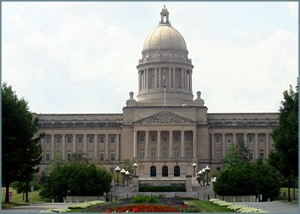John Steffen, executive director of the Executive Branch Ethics Commission, is stepping down to become the director of the Registry of Election Finance. Steffen will replace Sarah Jackson who retired last fall. The transition will take place in May and […]
 John Steffen, executive director of the Executive Branch Ethics Commission, is stepping down to become the director of the Registry of Election Finance.
John Steffen, executive director of the Executive Branch Ethics Commission, is stepping down to become the director of the Registry of Election Finance.
Steffen will replace Sarah Jackson who retired last fall.
The transition will take place in May and the ethics commission will meet May 4 to determine who will replace Steffen.
March 11, 2015 •
Legislative Ethics Director Retiring in Kentucky
Anthony Wilhoit, Executive Director of the Kentucky Legislative Ethics Commission, announced he will retire from the post this spring. Wilhoit, who has held the position since 1997, will step down once the nine-member independent commission selects a new director. In […]
 Anthony Wilhoit, Executive Director of the Kentucky Legislative Ethics Commission, announced he will retire from the post this spring. Wilhoit, who has held the position since 1997, will step down once the nine-member independent commission selects a new director.
Anthony Wilhoit, Executive Director of the Kentucky Legislative Ethics Commission, announced he will retire from the post this spring. Wilhoit, who has held the position since 1997, will step down once the nine-member independent commission selects a new director.
In his announcement, the former Court of Appeals judge stated it is time for new leadership at the commission and he wants to take on new community matters in Woodford County.
September 22, 2014 •
Head of Kentucky’s Campaign Finance Registry Will Retire Later This Year
The executive director of the Kentucky Registry of Election Finance is stepping down. Sarah Jackson, who has held the position since 1999, announced her retirement effective November 1. During her tenure, Jackson expanded the state’s electronic campaign finance reporting program […]
 The executive director of the Kentucky Registry of Election Finance is stepping down. Sarah Jackson, who has held the position since 1999, announced her retirement effective November 1.
The executive director of the Kentucky Registry of Election Finance is stepping down. Sarah Jackson, who has held the position since 1999, announced her retirement effective November 1.
During her tenure, Jackson expanded the state’s electronic campaign finance reporting program and established an online searchable database.
Rebecca Feland, a budget analyst with the Registry, has been named the interim director.
July 14, 2014 •
Kentucky Changes to Lobbying Gift Law Take Effect
New restrictions on legislative lobbying expenditures take effect Monday, July 14, 2014. House Bill 28 includes a “no cup of coffee rule” to eliminate the gift exception allowing legislative lobbyists to spend $100 on food and beverage for a legislator. […]
 New restrictions on legislative lobbying expenditures take effect Monday, July 14, 2014. House Bill 28 includes a “no cup of coffee rule” to eliminate the gift exception allowing legislative lobbyists to spend $100 on food and beverage for a legislator.
New restrictions on legislative lobbying expenditures take effect Monday, July 14, 2014. House Bill 28 includes a “no cup of coffee rule” to eliminate the gift exception allowing legislative lobbyists to spend $100 on food and beverage for a legislator.
Legislative lobbyists and their employers are now also prohibited from providing out-of-state transportation or lodging for legislators.
Employers of legislative lobbyists are prohibited from making campaign contributions during a regular legislative session and required to disclose the cost of advertising supporting or opposing legislation.
Counsel for the Kentucky Legislative Ethics Commission John Schaaf testified before the Pennsylvania Senate State Government Committee on Kentucky’s strict ethics laws. Pennsylvania has one of the most lax ethics laws in the country, permitting officials to receive gifts in […]

Counsel for the Kentucky Legislative Ethics Commission John Schaaf testified before the Pennsylvania Senate State Government Committee on Kentucky’s strict ethics laws. Pennsylvania has one of the most lax ethics laws in the country, permitting officials to receive gifts in any amount, while Kentucky recently made its own strict law even more stringent by prohibiting all lobbyist gifts. Pennsylvania’s ethics laws have been under scrutiny after the recent allegations of legislators accepting cash payments from a lobbyist as part of a sting operation.
Schaaf testified about prior changes to Kentucky’s law enacted in a special session in 1993, in response to several legislators charged with ethics violations by the FBI. Schaaf stressed the importance of getting a law on the books; once enacted, it is difficult to change.
However, Kentucky’s ethics law only covers legislators and legislative candidates, and Pennsylvania Senator Lloyd Smucker, sponsor of a bill banning cash gifts, said broadening such a ban to other government employees makes the legislation more complex and may make it difficult to win support. Still, Pennsylvania’s lawmakers were interested in Kentucky’s approach to ethics, particularly the idea of an independent ethics commission available to answer questions from lawmakers and lobbyists.
April 3, 2014 •
Kentucky Passes Ethics Legislation
Nearing the end of its 2014 session, the Kentucky General Assembly passed significant ethics legislation containing recommendations the Legislative Ethics Commission has requested for years. House Bill 28 prohibits employers of legislative lobbyists and permanent committees from making campaign contributions […]

Nearing the end of its 2014 session, the Kentucky General Assembly passed significant ethics legislation containing recommendations the Legislative Ethics Commission has requested for years. House Bill 28 prohibits employers of legislative lobbyists and permanent committees from making campaign contributions to legislators and candidates for the General Assembly during a regular legislative session. Employers of legislative lobbyists must disclose on their expenditure reports the cost of advertising supporting or opposing legislation during a session of the General Assembly.
The bill also includes the “no cup of coffee rule,” eliminating the exception previously allowing legislative lobbyists to spend up to $100 on food and beverage for a legislator, extends the gift prohibition to legislative candidates, and prohibits legislative lobbyists and their employers from providing out-of-state transportation or lodging for legislators.
The bill awaits signature by Gov. Beshear.
January 13, 2014 •
Ethics Bill Introduced in Kentucky
Kentucky could see updates to its legislative ethics code this session. House Bill 3 would amend the state ethics code to include recommendations of the Legislative Ethics Commission, including: Establishing a “no cup of coffee” rule for gifts from lobbyists […]

Kentucky could see updates to its legislative ethics code this session.
House Bill 3 would amend the state ethics code to include recommendations of the Legislative Ethics Commission, including:
- Establishing a “no cup of coffee” rule for gifts from lobbyists and employers to legislators;
- Creating a prohibition on lobbyists and employers paying for out-of-state travel for legislators;
- Including employers of legislative and executive branch lobbyists in the prohibition on campaign contributions during a regular legislative session;
- Requiring the reporting of advertising costs for advertising supporting or opposing legislation; and
- Including legislative candidates in the lobbyist gift prohibition.
The Legislative Ethics Commission has included those recommendations for a number of years in its report to the Legislative Research Commission. The existing ethics law was enacted in 1993.
January 2, 2014 •
Kentucky Legislative Ethics Commission Offering Lobbyist Workshop
The Legislative Research Commission (LRC) will conduct an optional lobbyist workshop on Wednesday, January 8, 2014. Legislative leaders and LRC employees will provide information about the legislative process, bill tracking, and ethics requirements. The workshop will begin at 9:00 a.m. […]
 The Legislative Research Commission (LRC) will conduct an optional lobbyist workshop on Wednesday, January 8, 2014.
The Legislative Research Commission (LRC) will conduct an optional lobbyist workshop on Wednesday, January 8, 2014.
Legislative leaders and LRC employees will provide information about the legislative process, bill tracking, and ethics requirements.
The workshop will begin at 9:00 a.m. and will be held in Room 149 of the Capitol Annex in Frankfort.
October 17, 2013 •
Two Kentucky Special Elections for December 10
House District 7 and Senate District 13
 Governor Steve Beshear has called two special elections for December 10, 2013. The elections will be in the 7th House District and the 13th Senate District.
Governor Steve Beshear has called two special elections for December 10, 2013. The elections will be in the 7th House District and the 13th Senate District.
The 7th District vacancy occurred after Rep. John Arnold resigned his seat in September following sexual harassment allegations from three Legislative Research Commission employees. The Legislative Ethics Commission recently determined there was probable cause Rep. Arnold violated the code of ethics and will hold a full hearing on the sexual harassment complaints on December 12.
The 13th Senate District vacancy occurred following Sen. Kathy Stein’s circuit judge appointment.
August 26, 2013 •
Kentucky Special Session Adjourns
Redistricting plan passed
 The Kentucky Legislature adjourned its special session on Friday, August 23, 2013, after passing a new redistricting plan.
The Kentucky Legislature adjourned its special session on Friday, August 23, 2013, after passing a new redistricting plan.
Governor Beshear quickly signed the bill after its passage.
Recommendations submitted to legislative research commission
 The Legislative Ethics Commission has renewed its 2012 recommendations for several changes to the code of legislative ethics.
The Legislative Ethics Commission has renewed its 2012 recommendations for several changes to the code of legislative ethics.
The recommended changes include:
- requiring employers of lobbyists to report the cost of advertising supporting or opposing legislation that appears during a session of the general assembly, if the cost is paid by an employer of lobbyists or a person affiliated with an employer;
- prohibiting employers of lobbyists and PACs from making campaign contributions to legislative candidates or legislators during a regular session of the general assembly, and prohibiting lobbyists from directly soliciting contributions for an election campaign of a legislator or legislative candidate;
- repeal the provision allowing each lobbyist and employer to spend up to $100 annually on food and beverages for each legislator and his or her immediate family, and prohibit lobbyists and employers from paying for out-of-state travel, food, or lodging expenses for legislators or candidates; and
- limiting the interaction between lobbyists and candidates who have filed to run for election to the general assembly, who are currently not subject to the $100 limit on food and beverage or prohibition on receiving anything of value from a lobbyist or employer.
March 27, 2013 •
Kentucky Legislature Adjourns
Passes pension reform in final hours
 The Kentucky Legislature adjourned its regular session on March 26, 2013. In the final hours of the session, lawmakers passed a bill to secure the state’s pension fund; had they been unable to reach an agreement, a special session would have been likely.
The Kentucky Legislature adjourned its regular session on March 26, 2013. In the final hours of the session, lawmakers passed a bill to secure the state’s pension fund; had they been unable to reach an agreement, a special session would have been likely.
However, the House of Representatives’ redistricting plan was not passed. The Kentucky Supreme Court struck down the Legislature’s first attempt at redistricting last year, finding the districts weren’t population-balanced and didn’t comply with the “one person, one vote” mandate.
The Senate decided to wait until next year’s legislative session to tackle redistricting, with leaders saying they wanted to pass both houses’ plans at the same time.
February 20, 2013 •
Kentucky Bill Would Prohibit Lobbying During Legislative Sessions
Both regular and extraordinary sessions covered by ban
 Senator Ray Jones has introduced a bill to prohibit lobbying during legislative sessions. Senate Bill 183 prohibits both legislative and executive lobbyists from contacting any member of the General Assembly, directly or indirectly, regarding any issue, bill, or proposal under consideration by the General Assembly during regular or extraordinary sessions.
Senator Ray Jones has introduced a bill to prohibit lobbying during legislative sessions. Senate Bill 183 prohibits both legislative and executive lobbyists from contacting any member of the General Assembly, directly or indirectly, regarding any issue, bill, or proposal under consideration by the General Assembly during regular or extraordinary sessions.
The bill restricts the definitions of legislative agent and executive branch lobbyist to include only those who either receive compensation for lobbying, or those lobbying on behalf of more than one group, organization, business, or public interest issue entity. If passed, lobbyists violating the prohibition will face a fine of $500 for each violation.
January 15, 2013 •
Special Election for Kentucky House District 52
Election scheduled February 12
 Governor Steve Beshear has set the special election to fill the House District 52 seat for February 12, 2013.
Governor Steve Beshear has set the special election to fill the House District 52 seat for February 12, 2013.
The election will fill the unexpired term of Sara Beth Gregory, who won a special election to the Kentucky Senate after former senate president David Williams resigned to accept a circuit judge appointment by Governor Beshear.
State and Federal Communications, Inc. provides research and consulting services for government relations professionals on lobbying laws, procurement lobbying laws, political contribution laws in the United States and Canada. Learn more by visiting stateandfed.com.

